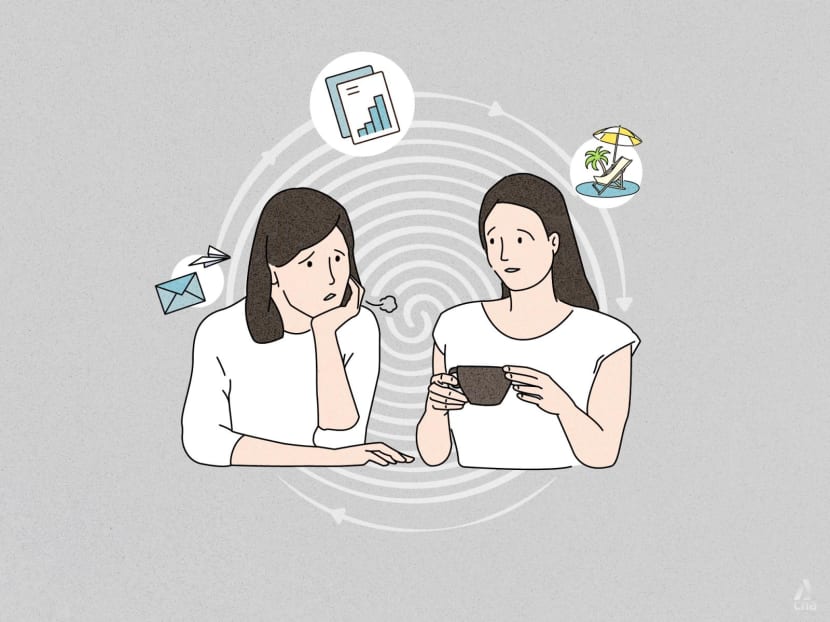The grown-up way to maintaining friendships and why being curious is helpful
Feel like your conversations with old friends tend to loop over the same few topics? Experts explain how "boring" friendships may be affecting your mental elasticity and what you can do about it.

Diverging interests or a tendency to avoid conflict in order to preserve harmony can make relationships feel less dynamic over time. (Illustration: CNA/Samuel Woo)

This audio is generated by an AI tool.
Adulthood is not just one phase of life but comes in stages. Its many facets can be overwhelming, from managing finances and buying a home to achieving work-life balance and maintaining healthy relationships. In this series, CNA TODAY's journalists help readers deal with the many challenges of being an adult and learn something themselves in the process.
When I graduated from university a few months ago, an older friend joked: "Welcome to the world of only talking about work and plans for your next annual leave."
At the time, I laughed at what I thought was a playful exaggeration on her part. But now, as my peers and I take our first steps into the world of full-fledged working adulthood, I already feel the quiet restlessness she warned me about creeping in.
Back in our university days when we all lived on campus, there was always something new happening – school events, late-night adventures, spontaneous suppers, shared projects and, of course, the occasional drama between classmates and roommates. Every time we gathered, there seemed to be something new to talk about.
Now, our conversations often traverse the same loop over the same few topics: work updates, weekend plans and shared memories.
This could simply be part of how friendships naturally stabilise over time. But on my way home from another such dinner last week, I caught myself wondering: Were we already trapped in the inevitable cycle of mundane dreariness, or is this the steady comfort that adult friendships are meant to provide?
FAMILIARITY CAN BE HEALTHY
Experts point to a few common factors that contribute to the "flattening" of friendships. For instance, life transitions such as graduating or starting a family can reduce the time and energy we have to invest in friendships.
Diverging interests or a tendency to avoid conflict in order to preserve harmony can also make relationships feel less dynamic over time.
However, that is not to say all our social connections have to be new and exciting. Familiarity often plays an important function in our social lives.
Some "boring" friendships are exactly what we need in terms of offering us a safe space to unwind and be ourselves. Not every friend has to challenge us or spark new ideas (as an introvert, the very thought of this already exhausts me).
Dr Kenneth Tan, an assistant professor of psychology at Singapore Management University (SMU), said: "Having a boring friendship is a normal thing and healthy for the most part, because it signifies stability and safety.
"There is comfort, predictability and shared routines between you and your friend or friendship group."
Dr Vincent Oh, senior lecturer of psychology at Singapore University of Social Sciences (SUSS), agreed that repetition is not necessarily a bad thing.
Revisiting shared memories can even have benefits.
"Nostalgia can give one a sense of coherence and meaning, and make people feel more connected to their own past as well as to others due to a sense of shared history," Dr Oh added.
Familiarity in a friendship doesn't mean it is failing. The problem is distinguishing between a steady rhythm that is healthy and a state of stagnation that may not be so beneficial for us.

HOW "BORING" FRIENDSHIPS AFFECT US
As it turns out, maintaining a certain level of novelty in our friendships isn't just about finding entertainment or finding something new to post on Instagram. It can have a serious effect on our holistic growth and development as individuals.
Much of this comes down to something psychologists call mental elasticity, or our ability to adapt to changes and switch perspectives.
Mental elasticity is a key component of our executive functioning, alongside things like working memory and inhibitory control. It allows us to regulate our emotions, adjust our expectations, and respond thoughtfully to our loved ones' perspectives and needs.
Research shows that high-quality friendships can even make us more mentally flexible, as they give us chances to practise and strengthen these skills.
"Being able to empathise with others and understand their perspectives is important for forming satisfying relationships," Dr Oh said. On the flip side, someone who is "cognitively inflexible" may default to insisting on their own viewpoint, making it harder for them to relate effectively to their friends, he added.
Improving our mental elasticity also helps us maintain dynamism and resilience in our friendships, preventing them from becoming rigid or repetitive.
It's a two-way street: Stronger friendships make for a stronger mind, and vice versa.
Then, there is such a thing as overfamiliarity. There is nothing wrong with friendships that provide comfort and stability, but such relationships can start to feel limiting if interactions become overly predictable or emotionally unfulfilling.
Research suggests that while nostalgia can strengthen connection in the short term, heavy reliance on it may be linked to greater depressive bouts and signal deeper issues in the relationship.
We also run the risk of creating echo chambers for ourselves in our friendships, where the same attitudes and viewpoints circulate repeatedly within the friendship.
Such reduced exposure to diversity of thought and social interaction can negatively affect our cognitive flexibility, Dr Tan from SMU said.
WHEN BORING BECOMES A BURDEN
This tug-of-war between the comfort of familiarity and the gnawing urge to grow is exactly what can make otherwise stable friendships start to feel "boring".
But how do we distinguish between a relationship that has found a steady rhythm and one that's stagnating?
Clinical counsellor and psychotherapist Stella Ong, co-founder of LightingWay Counselling & Therapy, said that one early warning sign is when conversations become so predictable that you can almost anticipate what your friend is about to say.
Another red flag is when attempts to introduce new topics are quickly redirected back to old territory.

Granted, for some people, relying on familiar topics can be a way of meeting their need for belonging and security by holding on to what feels known.
The irony, Ms Ong said, is that while this behaviour is meant to preserve the friendship, it can wind up causing more strain, either by making conversations feel repetitive or hollow, or even by making the other person feel as though only their past self is welcome in the friendship.
"I often see clients who feel like their friend relates more to who they were before, rather than who they are becoming," she added.
When attempts to share their present experiences are dismissed, initial frustration can build into deeper feelings of loneliness, sadness and disconnection.
Reflecting on my own friendships, I realised that I've probably been guilty of doing this a few times myself.
Most of the time, it was out of fear. If I asked too many questions, would others see it as prying?
I also had to reckon with a difficult truth about myself: Sometimes I held back because I felt that acknowledging change openly would mean altering a long-cherished friendship in ways I didn't yet feel ready to embrace.
WHAT ARE WE BRINGING TO THE RELATIONSHIP?
Ultimately, different friendships can meet different needs, Dr Oh from SUSS said. Some friends may provide a greater sense of novelty and stimulation, but it doesn't mean we have to be constantly trying new things with all our friends.
"Having a variety of friendships that meet different social needs can be another pathway to having more satisfying relational networks overall."
The experts also noted that while new experiences can help keep friendships stimulating, we can also change how we show up for our friends by bringing curiosity and intention into our relationship.
Try sitting down to reflect on what exactly you value in your friendships at your current stage of life. Is it comfort? Challenge? Support or shared growth? We can't control how our friends respond, but what we can do is express our needs clearly.
Ms Ong also advised practising curiosity in our friendships. For instance, make it a point to actively ask your friends about their current interests, challenges or perspectives, instead of defaulting to tempting familiar patterns.
Simple steps include suggesting new shared experiences, asking open-ended questions and sharing your own current challenges or vulnerabilities. "If you want more meaningful dialogue, start by modelling it yourself," Ms Ong said.
However, even with curiosity and intentional effort, some friendships may naturally reach a point where they no longer meet our needs.
"Some friends anchor us to our past selves and shared experiences, while others grow alongside us and push us forward. Problems arise when expectations no longer match," Ms Ong said.
Not all friendships are meant to last forever. Some are for a season, others for life.
The key is appreciating what a friendship has given you while recognising when it no longer serves you.
Nevertheless, the healthiest approach is a candid conversation: express your needs, listen to theirs and explore whether a new way of connecting is possible.













